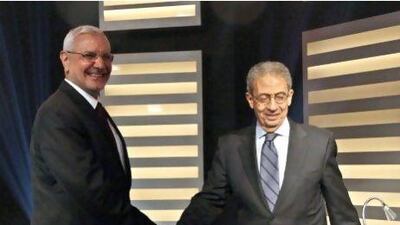CAIRO // Throughout the four-hour presidential debate, the two candidates repeatedly went for the kill.
Amr Moussa, the former foreign minister of Egypt and front-runner in the presidential race, tried to paint his opponent as a political chameleon who says what each audience wants to hear, while keeping his true extremist beliefs hidden.
And Abdel Moneim Aboul Fotouh, a self-styled moderate Islamist and former member of the leadership of the Muslim Brotherhood, called Mr Moussa a former lackey of ousted president Hosni Mubarak who represented the continuation of the old regime.
But while each had his minor coups, the shots on Thursday night failed to find their mark. Neither candidate walked away from Egypt's first televised presidential debate a clear victor.
Although there are 13 candidates in the race, Egypt's TV networks opted to broadcast a debate between the two favourites. The networks have not announced plans for any other debates.
Wearing dark suits and subdued, striped ties, the men shook hands for a moment before disappearing into the shadows of the studio.
The stalemate was to be expected. After the disqualifications of 10 presidential candidates last month by the Supreme Presidential Election Commission, the landscape was altered so dramatically that it appeared as if the race was to be between nobody's favourites.
If the likes of Khairat Al Shater, a millionaire former deputy leader of the Muslim Brotherhood; Omar Suleiman, Egypt's former spy chief; and Hazem Abu Ismail, a Salafist preacher, sparred on television, there is little doubt that the result would have been a thrilling spectacle. But these three men - the most polarising and charismatic leaders to emerge from the turmoil caused by Mubarak's resignation - were all barred for technical violations.
Overnight, the steady, yet unexciting campaigns of Mr Moussa and Mr Aboul Fotouh landed in the centre stage of the most important presidential election in six decades.
Each illustrated how he saw the fault lines of Egypt after 15 months of protests, clashes and general uncertainty over the country's trajectory. Mr Moussa played to the widest audience, portraying himself as a vote for a return to stability who respected the role of religion and had the CV to handle the job. He was Mubarak's foreign minister until 2001, when he became the head of the Arab League for 10 years.
"I call citizens to vote for me because I was tested in different positions and I served in the best way," he said in the second round of the debate, where the talk show host Yosri Fouda was moderating. "Egypt needs a man who understands the political context in the region and internationally … The country is in a very dangerous position."
Mr Aboul Fotouh aimed for a smaller, but more politically active audience. He said he supported the revolutionaries who held protests against the military regime and described how the principles of Islamic law respected all people, no matter their religion, and provided the best road map to justice and equality in a country that lacks both.
But as with the US presidential elections, where televised debates are a tradition, the candidates did not reveal any significant differences in their campaign platforms. Mr Aboul Fotouh called Israel "an enemy" that "doesn't respect international decisions". Mr Moussa, ever the diplomat, said he supported the Palestinian cause.
Strangely, Egypt's rapidly deteriorating economy - arguably the most pressing issue - was hardly mentioned in a debate that largely focused on the role of Islam in the state and political history. Both supported a higher minimum wage and a lower maximum wage for the public sector; both supported progressive taxation; both gave a nod to the need to reduce energy subsidies.
There is no doubt that viewership was high. Many cafes were full of shisha smokers who cheered each flare of emotion as a countdown beeped the final seconds of the allotted time.
But it was a challenge to watch. Not only were viewers subjected to a barrage of advertisements, but it started 30 minutes late and continued past 2am.
The debate failed to establish a heavy favourite in the election on May 23 and 24, when elections are scheduled to take place.
Polls have repeatedly placed Mr Moussa as the front-runner, with Mr Aboul Fotouh trailing by a small margin.
But the more important statistic is the percentage of undecided voters. A poll released Thursday from the government's think tank, the Information and Decision Support Centre, revealed that 39 per cent of respondents have not yet decided who they will support.
With the most magnetic personalities barred from the race, voters will be hard-pressed to figure out which candidate is the pragmatic choice. It could easily swing either way up to the last minute.
bhope@thenational.ae

